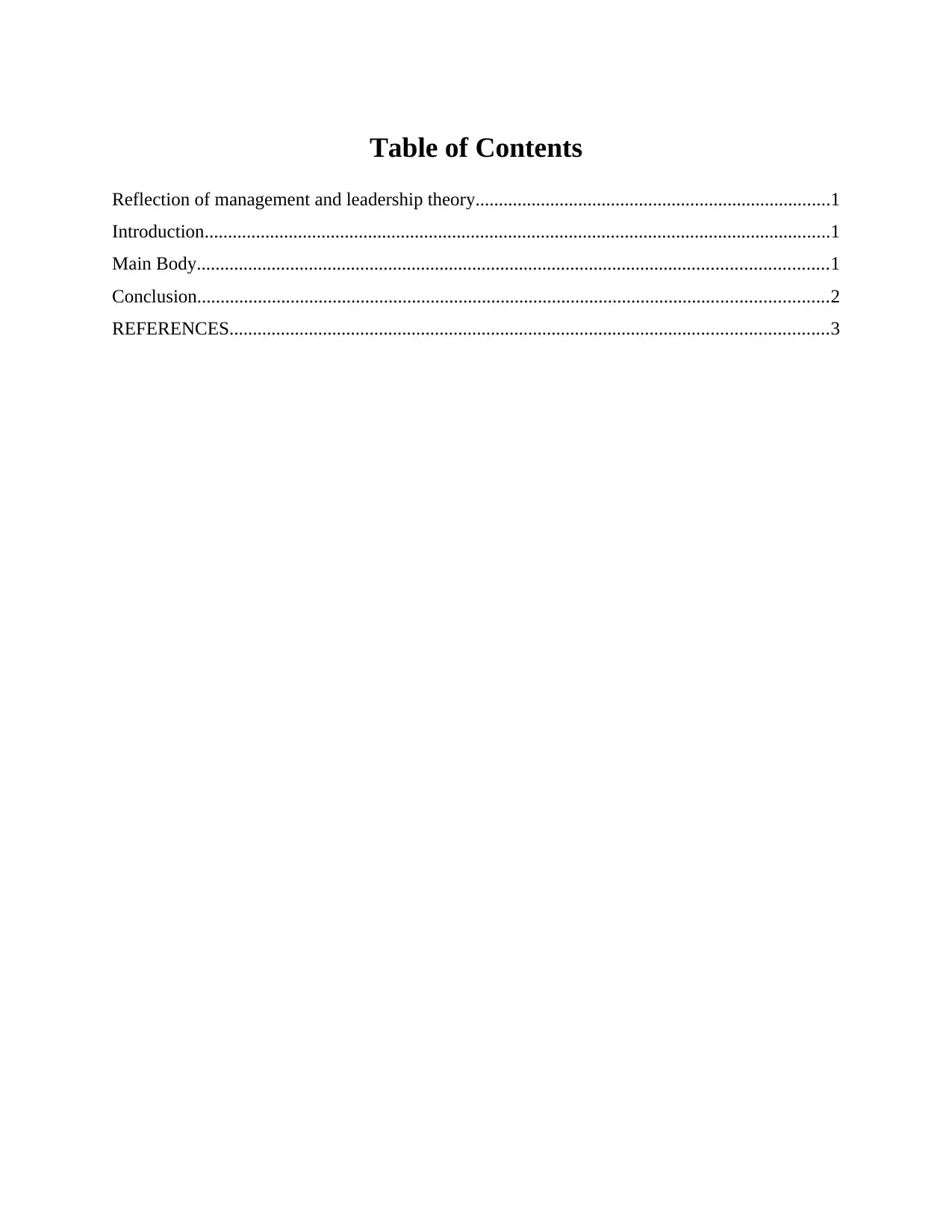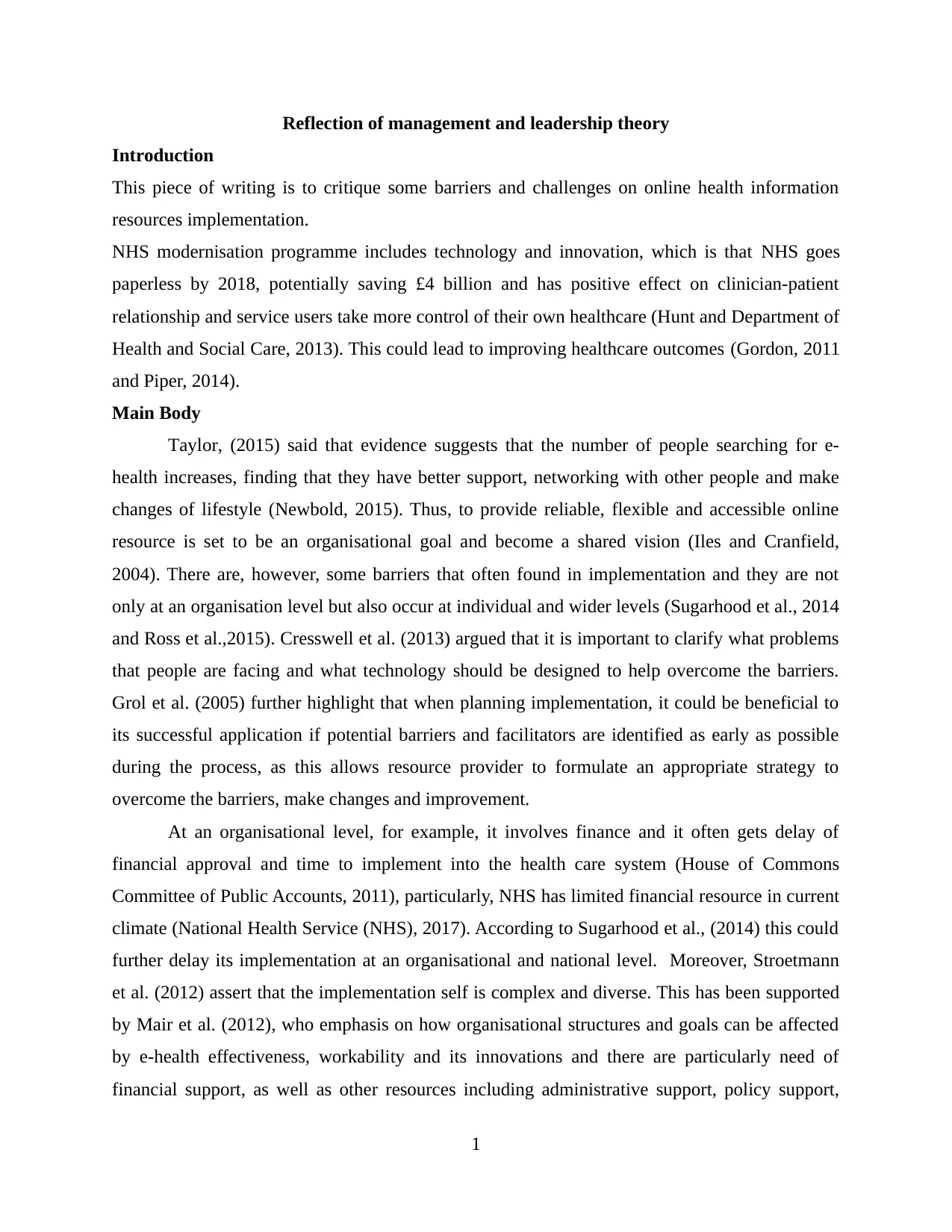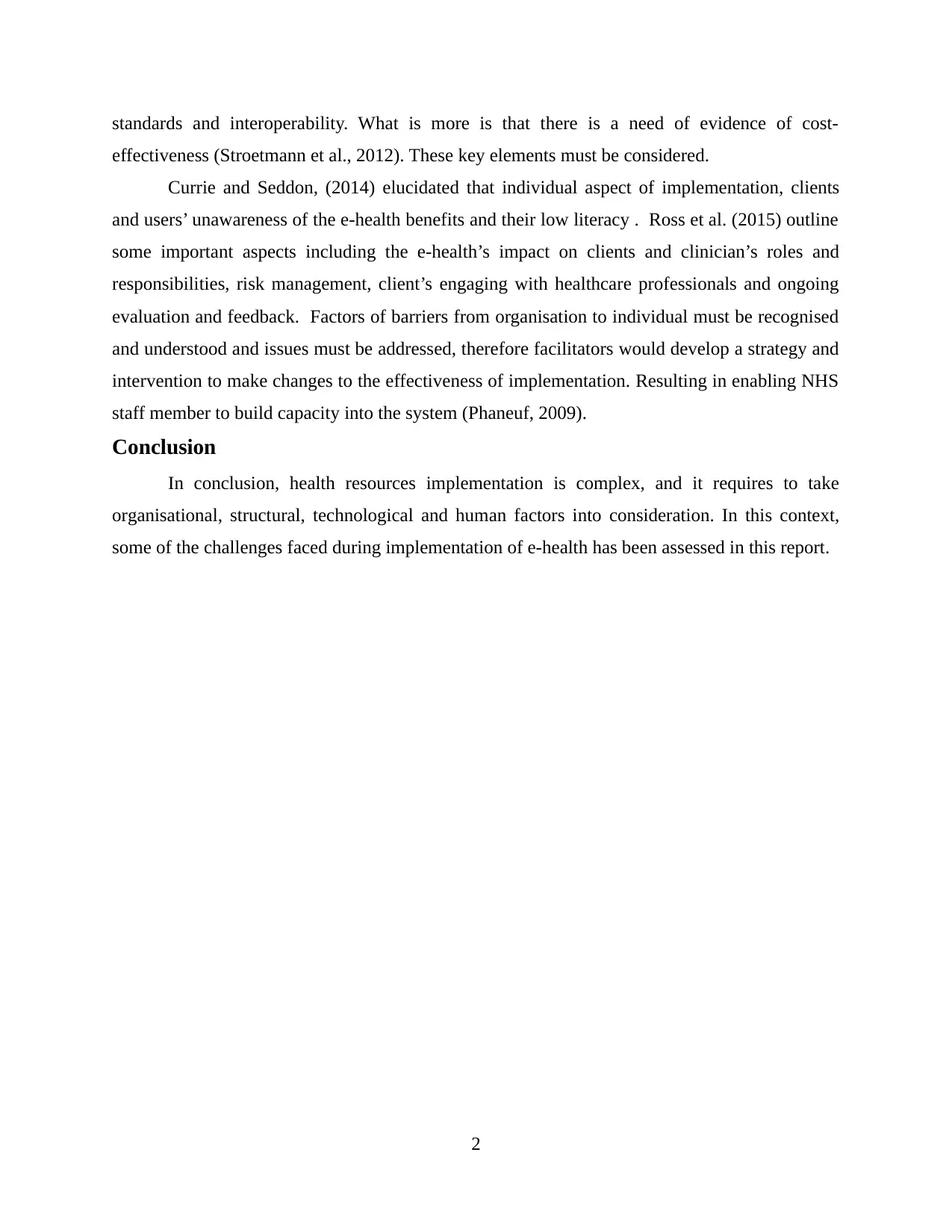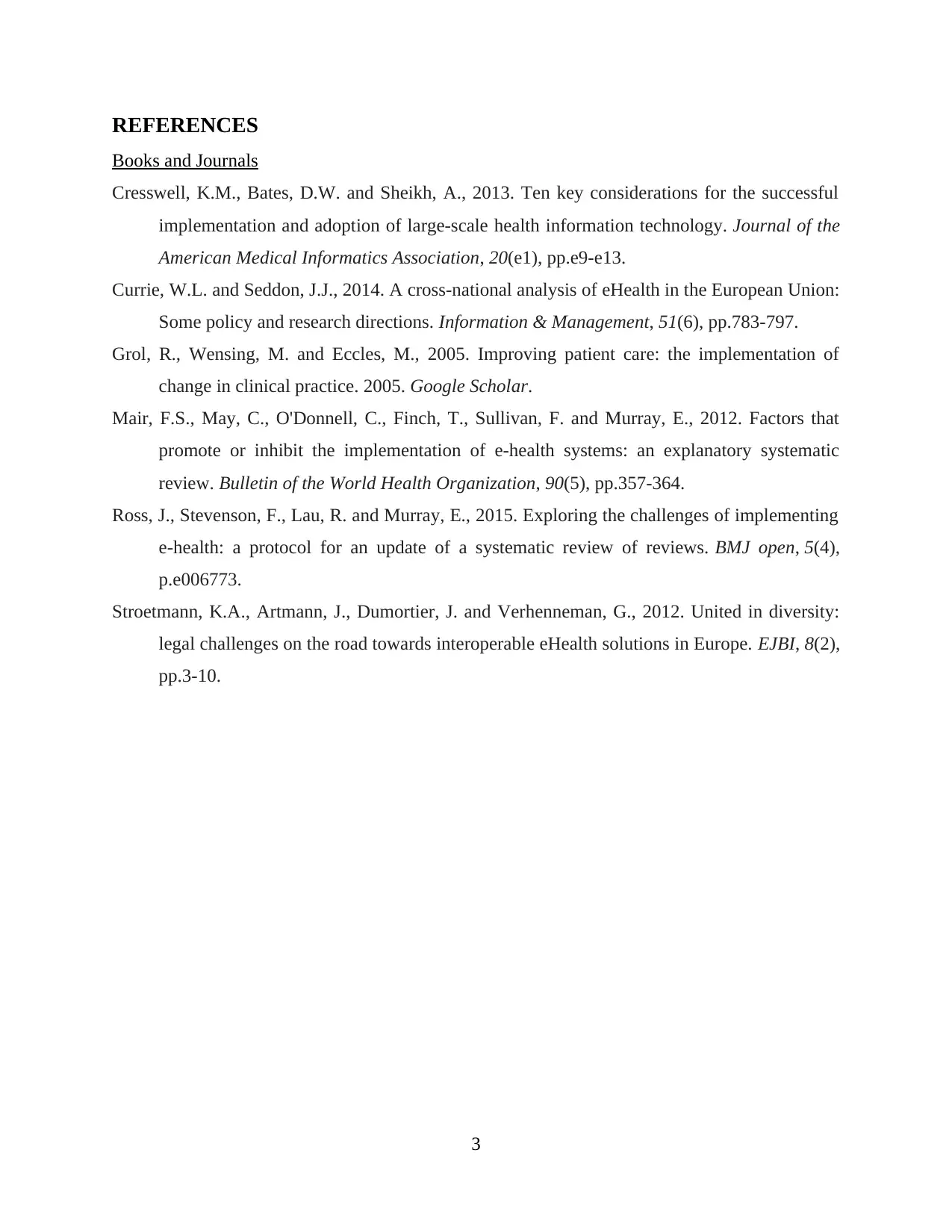Challenges in Implementing Online Health Resources: A Brief Report
VerifiedAdded on 2020/10/22
|5
|941
|126
Report
AI Summary
This report critically examines the barriers and challenges associated with the implementation of online health information resources, specifically within the context of the NHS modernization program. It highlights the potential benefits of e-health, such as improved patient control and healthcare outcomes, while also addressing significant obstacles. The report identifies challenges at organizational levels, including financial constraints and the complexities of implementation, as well as individual barriers such as user unawareness and low literacy. It emphasizes the importance of understanding these factors to develop effective strategies and interventions for successful e-health implementation, ultimately enabling NHS staff to build capacity within the system. The report references several studies and articles to support its findings, concluding that a comprehensive approach considering organizational, structural, technological, and human factors is essential for the successful integration of online health resources.

Transition to
Professional Practice
Professional Practice
Paraphrase This Document
Need a fresh take? Get an instant paraphrase of this document with our AI Paraphraser

Table of Contents
Reflection of management and leadership theory............................................................................1
Introduction......................................................................................................................................1
Main Body.......................................................................................................................................1
Conclusion.......................................................................................................................................2
REFERENCES................................................................................................................................3
Reflection of management and leadership theory............................................................................1
Introduction......................................................................................................................................1
Main Body.......................................................................................................................................1
Conclusion.......................................................................................................................................2
REFERENCES................................................................................................................................3

Reflection of management and leadership theory
Introduction
This piece of writing is to critique some barriers and challenges on online health information
resources implementation.
NHS modernisation programme includes technology and innovation, which is that NHS goes
paperless by 2018, potentially saving £4 billion and has positive effect on clinician-patient
relationship and service users take more control of their own healthcare (Hunt and Department of
Health and Social Care, 2013). This could lead to improving healthcare outcomes (Gordon, 2011
and Piper, 2014).
Main Body
Taylor, (2015) said that evidence suggests that the number of people searching for e-
health increases, finding that they have better support, networking with other people and make
changes of lifestyle (Newbold, 2015). Thus, to provide reliable, flexible and accessible online
resource is set to be an organisational goal and become a shared vision (Iles and Cranfield,
2004). There are, however, some barriers that often found in implementation and they are not
only at an organisation level but also occur at individual and wider levels (Sugarhood et al., 2014
and Ross et al.,2015). Cresswell et al. (2013) argued that it is important to clarify what problems
that people are facing and what technology should be designed to help overcome the barriers.
Grol et al. (2005) further highlight that when planning implementation, it could be beneficial to
its successful application if potential barriers and facilitators are identified as early as possible
during the process, as this allows resource provider to formulate an appropriate strategy to
overcome the barriers, make changes and improvement.
At an organisational level, for example, it involves finance and it often gets delay of
financial approval and time to implement into the health care system (House of Commons
Committee of Public Accounts, 2011), particularly, NHS has limited financial resource in current
climate (National Health Service (NHS), 2017). According to Sugarhood et al., (2014) this could
further delay its implementation at an organisational and national level. Moreover, Stroetmann
et al. (2012) assert that the implementation self is complex and diverse. This has been supported
by Mair et al. (2012), who emphasis on how organisational structures and goals can be affected
by e-health effectiveness, workability and its innovations and there are particularly need of
financial support, as well as other resources including administrative support, policy support,
1
Introduction
This piece of writing is to critique some barriers and challenges on online health information
resources implementation.
NHS modernisation programme includes technology and innovation, which is that NHS goes
paperless by 2018, potentially saving £4 billion and has positive effect on clinician-patient
relationship and service users take more control of their own healthcare (Hunt and Department of
Health and Social Care, 2013). This could lead to improving healthcare outcomes (Gordon, 2011
and Piper, 2014).
Main Body
Taylor, (2015) said that evidence suggests that the number of people searching for e-
health increases, finding that they have better support, networking with other people and make
changes of lifestyle (Newbold, 2015). Thus, to provide reliable, flexible and accessible online
resource is set to be an organisational goal and become a shared vision (Iles and Cranfield,
2004). There are, however, some barriers that often found in implementation and they are not
only at an organisation level but also occur at individual and wider levels (Sugarhood et al., 2014
and Ross et al.,2015). Cresswell et al. (2013) argued that it is important to clarify what problems
that people are facing and what technology should be designed to help overcome the barriers.
Grol et al. (2005) further highlight that when planning implementation, it could be beneficial to
its successful application if potential barriers and facilitators are identified as early as possible
during the process, as this allows resource provider to formulate an appropriate strategy to
overcome the barriers, make changes and improvement.
At an organisational level, for example, it involves finance and it often gets delay of
financial approval and time to implement into the health care system (House of Commons
Committee of Public Accounts, 2011), particularly, NHS has limited financial resource in current
climate (National Health Service (NHS), 2017). According to Sugarhood et al., (2014) this could
further delay its implementation at an organisational and national level. Moreover, Stroetmann
et al. (2012) assert that the implementation self is complex and diverse. This has been supported
by Mair et al. (2012), who emphasis on how organisational structures and goals can be affected
by e-health effectiveness, workability and its innovations and there are particularly need of
financial support, as well as other resources including administrative support, policy support,
1
⊘ This is a preview!⊘
Do you want full access?
Subscribe today to unlock all pages.

Trusted by 1+ million students worldwide

standards and interoperability. What is more is that there is a need of evidence of cost-
effectiveness (Stroetmann et al., 2012). These key elements must be considered.
Currie and Seddon, (2014) elucidated that individual aspect of implementation, clients
and users’ unawareness of the e-health benefits and their low literacy . Ross et al. (2015) outline
some important aspects including the e-health’s impact on clients and clinician’s roles and
responsibilities, risk management, client’s engaging with healthcare professionals and ongoing
evaluation and feedback. Factors of barriers from organisation to individual must be recognised
and understood and issues must be addressed, therefore facilitators would develop a strategy and
intervention to make changes to the effectiveness of implementation. Resulting in enabling NHS
staff member to build capacity into the system (Phaneuf, 2009).
Conclusion
In conclusion, health resources implementation is complex, and it requires to take
organisational, structural, technological and human factors into consideration. In this context,
some of the challenges faced during implementation of e-health has been assessed in this report.
2
effectiveness (Stroetmann et al., 2012). These key elements must be considered.
Currie and Seddon, (2014) elucidated that individual aspect of implementation, clients
and users’ unawareness of the e-health benefits and their low literacy . Ross et al. (2015) outline
some important aspects including the e-health’s impact on clients and clinician’s roles and
responsibilities, risk management, client’s engaging with healthcare professionals and ongoing
evaluation and feedback. Factors of barriers from organisation to individual must be recognised
and understood and issues must be addressed, therefore facilitators would develop a strategy and
intervention to make changes to the effectiveness of implementation. Resulting in enabling NHS
staff member to build capacity into the system (Phaneuf, 2009).
Conclusion
In conclusion, health resources implementation is complex, and it requires to take
organisational, structural, technological and human factors into consideration. In this context,
some of the challenges faced during implementation of e-health has been assessed in this report.
2
Paraphrase This Document
Need a fresh take? Get an instant paraphrase of this document with our AI Paraphraser

REFERENCES
Books and Journals
Cresswell, K.M., Bates, D.W. and Sheikh, A., 2013. Ten key considerations for the successful
implementation and adoption of large-scale health information technology. Journal of the
American Medical Informatics Association, 20(e1), pp.e9-e13.
Currie, W.L. and Seddon, J.J., 2014. A cross-national analysis of eHealth in the European Union:
Some policy and research directions. Information & Management, 51(6), pp.783-797.
Grol, R., Wensing, M. and Eccles, M., 2005. Improving patient care: the implementation of
change in clinical practice. 2005. Google Scholar.
Mair, F.S., May, C., O'Donnell, C., Finch, T., Sullivan, F. and Murray, E., 2012. Factors that
promote or inhibit the implementation of e-health systems: an explanatory systematic
review. Bulletin of the World Health Organization, 90(5), pp.357-364.
Ross, J., Stevenson, F., Lau, R. and Murray, E., 2015. Exploring the challenges of implementing
e-health: a protocol for an update of a systematic review of reviews. BMJ open, 5(4),
p.e006773.
Stroetmann, K.A., Artmann, J., Dumortier, J. and Verhenneman, G., 2012. United in diversity:
legal challenges on the road towards interoperable eHealth solutions in Europe. EJBI, 8(2),
pp.3-10.
3
Books and Journals
Cresswell, K.M., Bates, D.W. and Sheikh, A., 2013. Ten key considerations for the successful
implementation and adoption of large-scale health information technology. Journal of the
American Medical Informatics Association, 20(e1), pp.e9-e13.
Currie, W.L. and Seddon, J.J., 2014. A cross-national analysis of eHealth in the European Union:
Some policy and research directions. Information & Management, 51(6), pp.783-797.
Grol, R., Wensing, M. and Eccles, M., 2005. Improving patient care: the implementation of
change in clinical practice. 2005. Google Scholar.
Mair, F.S., May, C., O'Donnell, C., Finch, T., Sullivan, F. and Murray, E., 2012. Factors that
promote or inhibit the implementation of e-health systems: an explanatory systematic
review. Bulletin of the World Health Organization, 90(5), pp.357-364.
Ross, J., Stevenson, F., Lau, R. and Murray, E., 2015. Exploring the challenges of implementing
e-health: a protocol for an update of a systematic review of reviews. BMJ open, 5(4),
p.e006773.
Stroetmann, K.A., Artmann, J., Dumortier, J. and Verhenneman, G., 2012. United in diversity:
legal challenges on the road towards interoperable eHealth solutions in Europe. EJBI, 8(2),
pp.3-10.
3
1 out of 5
Related Documents
Your All-in-One AI-Powered Toolkit for Academic Success.
+13062052269
info@desklib.com
Available 24*7 on WhatsApp / Email
![[object Object]](/_next/static/media/star-bottom.7253800d.svg)
Unlock your academic potential
Copyright © 2020–2026 A2Z Services. All Rights Reserved. Developed and managed by ZUCOL.




